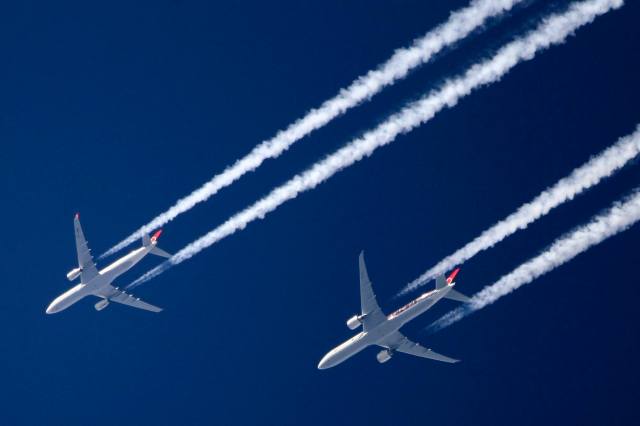(Credit Image: Dan Kitwood/Getty Images)

Will humanity win the fight against climate change? The cost of low carbon energy is coming down fast, but the task of decarbonising the global economy is a huge one. So what if we fail? Is there a plan B?
Yes, say the proponents of geoengineering – who believe that by making deliberate, planetary-scale changes to the natural environment we can cancel out the effect of the greenhouse gases we’re still pumping into the atmosphere.
For instance, by releasing fine particles into the atmosphere we can partially block out sunlight, which would have a cooling effect. This is called stratospheric aerosol injection and to varying extents it happens naturally when volcanoes explode.
In a previous UnPacked, I argued that prevention is better than cure – especially when we’ve never tried the latter before and the only way of doing so is to experiment on seven billion people (not to mention every other living thing on the planet):
Writing for MIT Technology Review, James Temple cites an further argument against geoengineering:
“A study published January 22 in Nature Ecology & Evolution suggests this is a bad idea. If the world ever starts doing geoengineering, the study warns, it may be too dangerous to ever stop.
“The problem, explains the paper, is that deliberately cooling the planet would mask any additional warming produced by greenhouse gases. This means that if the world decided to stop geoengineering, say, 50 years later, the greenhouse effect that had built up during that time would warm the planet very rapidly.”
The principle is that the faster the pace of climate change the harder it is to adapt to it:
“In many areas, temperatures would rise two to four times faster than historical averages, the study found. Change would occur too fast for many plants and animals to migrate to new areas, fragmenting ecosystems and driving species extinct. It could also reduce rain across the Amazon, Northern Europe, and Asia and increase the number and severity of tropical forest fires.”
People would have a harder time adapting too – especially the poorest people on the planet, who tend to live in the most vulnerable environments and have the fewest options to move elsewhere.
Temple does not dispute this research, but he pours cold water on the idea that a “sudden termination” of large-scale geoengineering would ever happen. If we do try to deliberately engineer the climate, he says, we’ll do it carefully:
“…if we ever decide to use these tools, we should start slowly and ramp up gradually over time. That would allow scientists to closely monitor changes, including the unexpected kind, and adjust accordingly. Geoengineering could have environmental side effects and uneven impacts in different regions, but those risks would probably become clear early on. Climate engineering could also be tapered off slowly in a way that would allow us to manage the impact on ecosystems.”
I’m not so sure. First of all, if geoengineering turns out to be cheap and effective, the temptation to carry on burning fossil fuels will become overwhelming. Clean energy is more affordable than it was and offers various benefits beyond decarbonisation (e.g. less local pollution), but fossil fuels are supported by entrenched interest groups, such as those currently controlling the White House. The more extensive our geoengineering efforts the bigger the excuse for polluters to carry on regardless, meaning we’ll need more geoengineering and so on and so forth.
As for the risks becoming “clear early on”, that’s a heroic assumption. Nature is full of discontinuities and tipping points – and that’s especially true of a highly complex and dynamic system like the global climate.
Temple insists that “there’s wide agreement that any decision to move forward with efforts that could affect the entire globe should be made through an open, transparent process conducted by an international body”. I’m sure that’s true of the thoughtful types who currently concern themselves with a future possibility like geoengineering. But what would happen if this became a live concern and a burning issue for international politics? The supporters of large-scale geoengineering admit that the impacts would be uneven; so what do you think the likes of Donald Trump, Vladimir Putin or Xi Jinping would do if their respective countries got the rough end of the deal?
In summary, there’s a very real chance that a viable geoengineering programme would ramp-up very quickly; displace not supplement clean energy investment; result in unexpected side-effects; escalate geopolitical tensions; and unleash extremely rapid global warming if suddenly terminated.
Messing about with the climate is not like a fiddling with a thermostat – turning it up with carbon emissions, dialling it down with a spot of geoengineering. Rather we’re interfering with a mechanism with a million, billion moving parts, one that we don’t fully understand, let alone control.










Join the discussion
Join like minded readers that support our journalism by becoming a paid subscriber
To join the discussion in the comments, become a paid subscriber.
Join like minded readers that support our journalism, read unlimited articles and enjoy other subscriber-only benefits.
Subscribe